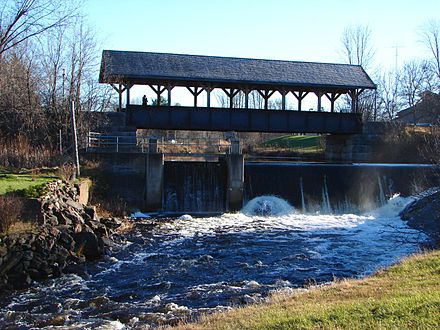Killaloe (Ontario) - village in Ontario, Canada
Killaloe is a small town in the Ottawa Valley, near Algonquin Provincial Park.
Understand
The shores of Golden Lake are 3 km (1.9 mi) to the east, which is well known for quality angling and year-round recreation.
There is little of note in the town, but those heading to the park or to other remote areas might consider stopping here for provisions.
Visitor information
History

In 1854 the construction of the Opeongo Line brought settlers and the logging industry to this area which had been occupied by the Algonquins. The Algonquin First Nation in the area still continue an ongoing land claim which covers the entire region. A majority of the settlers were French Canadians and Irish Catholic immigrants but among them were Poles, Kashubians and Germans as well.
With the railway construction essentially finished, and the forestry industry declining many of the people took to farming. Unfortunately the soil was poor. Rocky land and short growing seasons meant that many farms failed. The population went into a steady decline which has only leveled off in the past few decades.
The lumber industry is still important to the livelihood of many in the surrounding communities. Large and small logging operations and sawmills still support the local economy even though the railway no longer runs through the village. Killaloe maintains a flavour of the turn of the century in many of the commercial buildings which are more than 100 years old.
In May 2014, the founders of BeaverTails Grant and Pam Hooker officially named Killaloe as the birthplace of the BeaverTails. This popular Canadian snack has named one of its signature versions after this town.
Get in
The major access to Killaloe is Highway 60.
Get around
The town is compact. Any journeys to outlying regions would require a car.
See and do
-
Bonnechere Provincial Park, 4024 Round Lake Rd. At the mouth of the Bonnechere River on Round Lake, the park provides over 100 campsites for car or RV camping. Swim on the sandy beach, or rent a canoe or kayak to paddle on the lake. Several hiking routes provide interpretive information about the area's cultural and natural history, including the historic depot and log cabins. The Highway 60 corridor through Algonquin Provincial Park is about 85 km away. 2023-03-16
-
Bonnechere River Provincial Park. A waterway park that follows the Bonnechere River from the Algonquin Park boundary to the Round Lake. The park is about 23 km in length, and includes a small amount of land along the river banks in most areas. The river's banks are easily accessed from roads and trails along both sides. Canoeing (with some short portages), hiking, swimming, and fishing are permitted. A small number of crown (public) lands permit back country camping. There are no fees or reservations, but it is wise to stop at the Bonnechere Provincial Park office for a detailed map of the waterway that shows access points and locations of legal (and suitable) campsites. The waterway is wilderness; despite being so close to a developed park, there are no staff or facilities inside the park. Be prepared to practice leave-no-trace camping. 2023-03-16
-
The Homestead at Wolf Ridge Golf Course, 214 Stone Church Rd, 45.53122°, -77.46396°. 18-hole golf course on highway 60, just west of Killaloe, on 220 acres of rolling farmland. A licensed club house and patio. 2018-06-29
Buy
For those heading to camping or for cottage country, the town is reasonably stocked with a grocery market and some other stores.
- Killaloe Freshmart, 188 Queen St. M-Sa 8AM-6PM. 2018-06-29
Eat and drink
- Garth's Kitchen, 14 Lake St, 45.55481°, -77.41455°, +1 613-281-2285. M-Th 8AM-2PM, F 8AM-7PM. Breakfasts, salads, pitas, burgers. Friday night: pizza. 2023-03-16
- BeaverTails, 170 Queen St, 45.55417°, -77.41609°. Summer only. Fried dough with sugar. What's not to like? 2018-06-28
- Creekside Grille, 170 Queen St. Fish and chips, poutine. 2018-06-28
Sleep
- Sands on Golden Lake, 13163 Hwy 60 (6 km from Killaloe), 45.5932°, -77.35445°, +1 613-704-5955. Suites, chalets, and cottages. Restaurant/lounge, and spa overlooking Golden Lake. Double from $155 2023-03-16